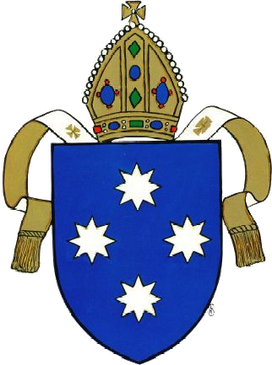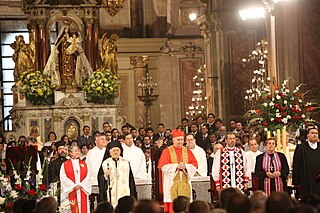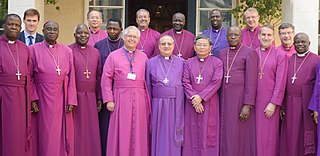Sharing of Ministries Abroad (SOMA) was founded in 1978 as a charity within the Anglican Communion worldwide to promote the work of the Holy Spirit by giving leadership training to clergy and church leaders.
Sharing of Ministries Abroad (SOMA) was founded in 1978 as a charity within the Anglican Communion worldwide to promote the work of the Holy Spirit by giving leadership training to clergy and church leaders.
It began at a conference before the Lambeth Conference of bishops from around the world, meeting at Canterbury, United Kingdom. It was believed[ who? ] that God was saying there was a need for an organisation to be "caring for the nervous system of the Church." This was interpreted[ who? ] as being the work of the Holy Spirit about whom there was perceived[ who? ] to be much ignorance at the time. SOMA's calling statement: "SOMA is a mission agency called by God to serve the Anglican Communion and the worldwide Church: by building up and equipping the Body of Christ; through the renewing power of the Holy Spirit; principally through short-term cross-cultural missions for the transformation of individuals, churches and communities." SOMA was founded in the United Kingdom, but it has since spread to other countries, including the United States, Canada, Singapore, South Africa, Australia, New Zealand, Brazil, Uganda and Ireland. Nigeria and South Korea are currently working on setting up SOMA offices. SOMA UK is a member of the international network of mission agencies Faith2Share
The most visible part of SOMA's work is the sending of teams of volunteers from churches in sending-countries to dioceses overseas at the invitation of local bishops. The volunteers come from churches sympathetic to the aims of SOMA who commit themselves to raising travel expenses for a 10- to 15-day short-term mission. The host dioceses aim to raise the finances for the cost of accommodation, both for the team members and for attending delegates. Teams have been sent to about 50 different countries, some of which are in situations of great poverty. This frequently places strain on the finances resulting in the need for fund-raising by supporters to enable missions to areas such as Southern Sudan, or Kitgum in northern Uganda to be possible. Biblical teaching material is provided by the visiting team and covers topics such as Renewal for Life; Healing; Gifts of the Spirit; Renewal in the Midst of Chaos; Building a Prophetic Community; Worship; Leadership; Marriage.

The Diocese of Sydney is a diocese in Sydney, within the Province of New South Wales of the Anglican Church of Australia. The majority of the diocese is evangelical and low church in tradition.
The Anglican Church of Southern Africa, known until 2006 as the Church of the Province of Southern Africa, is the province of the Anglican Communion in the southern part of Africa. The church has twenty-five dioceses, of which twenty-one are located in South Africa, and one each in Eswatini, Lesotho, Namibia and Saint Helena. In South Africa, there are between 3 and 4 million Anglicans out of an estimated population of 45 million.

The Church of Uganda is a member province of the Anglican Communion. Currently there are 37 dioceses which make up the Church of Uganda, each headed by a bishop.

The Reformed Episcopal Church (REC) is an Anglican church of evangelical Episcopalian heritage. It was founded in 1873 in New York City by George David Cummins, a former bishop of the Protestant Episcopal Church.

The Catholic Church has engaged in the modern ecumenical movement especially since the Second Vatican Council (1962-1965) and the issuing of the decree Unitatis redintegratio and the declaration Dignitatis humanae. It was at the Council that the Pontifical Council for Promoting Christian Unity was created. Those outside of the Catholic Church were categorised as heretics or schismatics, but in many contexts today, to avoid offence, the euphemism "separated brethren" is used.

The Anglican ministry is both the leadership and agency of Christian service in the Anglican Communion. "Ministry" commonly refers to the office of ordained clergy: the threefold order of bishops, priests and deacons. More accurately, Anglican ministry includes many laypeople who devote themselves to the ministry of the church, either individually or in lower/assisting offices such as lector, acolyte, sub-deacon, Eucharistic minister, cantor, musicians, parish secretary or assistant, warden, vestry member, etc. Ultimately, all baptized members of the church are considered to partake in the ministry of the Body of Christ.

The Anglican Church of Kenya (ACK) is a province of the Anglican Communion, and it is composed by 41 dioceses. The current Primate and Archbishop of Kenya is Jackson Ole Sapit. The Anglican Church of Kenya claims 5 million total members. According to a study published in the Journal of Anglican Studies and by Cambridge University Press, the ACK claims 5 million adherents, with no official definition of membership, with nearly 2 million officially affiliated members, and 310,000 active baptised members. The church became part of the Province of East Africa in 1960, but Kenya and Tanzania were divided into separate provinces in 1970.
The Church of the Province of Central Africa is part of the Anglican Communion, and includes 15 dioceses in Botswana, Malawi, Zambia and Zimbabwe. The Primate of the Church is the Archbishop of Central Africa. Albert Chama is the current archbishop, being installed on 20 March 2011, succeeding Bernard Amos Malango who retired in 2007. From 1980 to 2000, Walter Khotso Makhulu, a noted Anti-Apartheid activist, was Archbishop as well as Bishop of Botswana. Archbishop Chama continues to serve as Bishop of Northern Zambia, and is the second Zambian to be Archbishop of Central Africa.
The Convergence Movement, also known as the Ancient-Future Faith movement, is a Protestant Christian movement that began during the Fourth Great Awakening (1960–1980) in the United States.
The Anglican realignment is a movement among some Anglicans to align themselves under new or alternative oversight within or outside the Anglican Communion. This movement is primarily active in parts of the Episcopal Church in the United States and the Anglican Church of Canada. Two of the major events that contributed to the movement were the 2002 decision of the Diocese of New Westminster in Canada to authorise a rite of blessing for same-sex unions, and the nomination of two openly gay priests in 2003 to become bishops. Jeffrey John, an openly gay priest with a long-time partner, was appointed to be the next Bishop of Reading in the Church of England and the General Convention of the Episcopal Church ratified the election of Gene Robinson, an openly gay non-celibate man, as Bishop of New Hampshire. Jeffrey John ultimately declined the appointment due to pressure.

The Global South Fellowship of Anglican Churches (GSFA), formerly known as Global South (Anglican), is a communion of 25 Anglican churches, of which 22 are provinces of the Anglican Communion, plus the Anglican Church in North America and the Anglican Church in Brazil. The Anglican Diocese of Sydney is also officially listed as a member.
The Province of the Anglican Church of Burundi is a province of the Anglican Communion, located in East Africa between Tanzania, Rwanda, Kenya, and the Congo. The Archbishop and Primate of Burundi is Sixbert Macumi.

The Anglican Church in North America (ACNA) is a Christian denomination in the Anglican tradition in the United States and Canada. It also includes ten congregations in Mexico, two mission churches in Guatemala, and a missionary diocese in Cuba. Headquartered in Ambridge, Pennsylvania, the church reported 974 congregations and 122,450 members in 2021. The first archbishop of the ACNA was Robert Duncan, who was succeeded by Foley Beach in 2014.
The Anglican Church of Rwanda is a province of the Anglican Communion, covering 13 dioceses in Rwanda. The primate of the province is Laurent Mbanda, consecrated on 10 June 2018.
The Global Anglican Future Conference (GAFCON) is a series of conferences of conservative Anglican bishops and leaders, the first of which was held in Jerusalem from 22 to 29 June 2008 to address the growing controversy of the divisions in the Anglican Communion, the rise of secularism, as well as concerns with HIV/AIDS and poverty. As a result of the conference, the Jerusalem Declaration was issued and the Global Fellowship of Confessing Anglicans was created. The conference participants also called for the creation of the Anglican Church in North America as an alternative to both the Episcopal Church in the United States and the Anglican Church of Canada, and declared that recognition by the Archbishop of Canterbury is not necessary to Anglican identity.
The Global Fellowship of Confessing Anglicans is a communion of conservative Anglican churches that formed in 2008 in response to ongoing theological disputes in the worldwide Anglican Communion. Conservative Anglicans met in 2008 at the Global Anglican Future Conference, creating the Jerusalem Declaration and establishing the Fellowship of Confessing Anglicans (FCA), which was rebranded as GAFCON in 2017.
Emmanuel Mbona Kolini is a Congolese-Rwandan Anglican bishop. He was the second Primate of the Episcopal Church of Rwanda, named Anglican Church of Rwanda in 2007, from 1998 to 2011. He is married and a father of eight children. Kolini currently serves as the rector of the Anglican Mission in the Americas College of Consultors.
The Church of Confessing Anglicans Aotearoa/New Zealand (CCAANZ) is an evangelical Anglican denomination in New Zealand. It is not a member of the Anglican Communion as recognised by the current Archbishop of Canterbury, but is recognised by the Global Anglican Future Conference (GAFCON). The church consists of 17 parishes, some of which consist of clergy and church members who left the Anglican Church in Aotearoa, New Zealand and Polynesia after it allowed bishops to authorise blessings of same-sex marriages, and some of which were newly established at the time of the formation of the church.
The Anglican Diocese of Awgu/Aninri is one of the 12 Anglican Dioceses in the ecclesiastical province of Enugu in the Church of Nigeria.
The Anglican Network in Europe (ANiE) is a small Christian denomination in the Anglican tradition with churches in Europe. Formed as part of the worldwide Anglican realignment, it is a member jurisdiction of the Global Fellowship of Confessing Anglicans (GAFCON) and is under the primatial oversight of the chairman of the GAFCON Primates Council. GAFCON recognizes ANiE as a "proto-province" operating separately from the Church of England, the Scottish Episcopal Church, the Church in Wales and other Anglican Communion jurisdictions in Great Britain and the European continent. ANiE is the body hierarchically above the preexisting Anglican Mission in England; the former is the equivalent of a province whilst the latter is a convocation, the equivalent of a diocese.